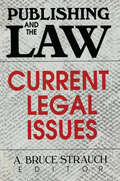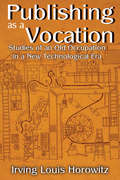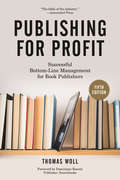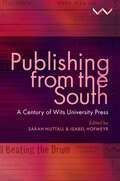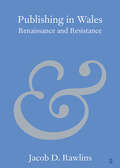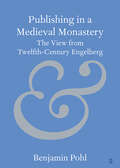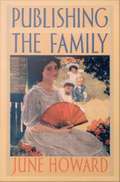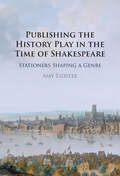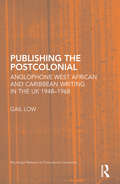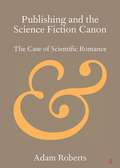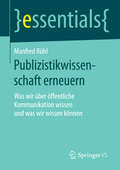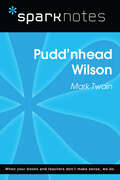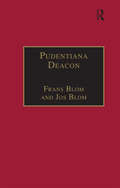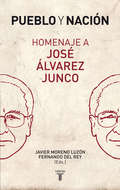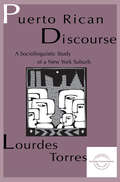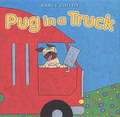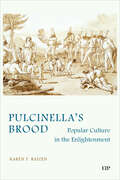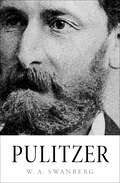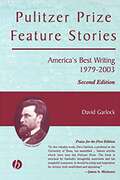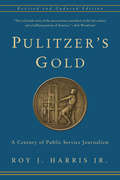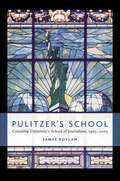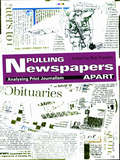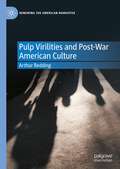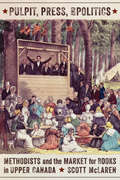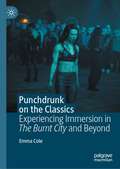- Table View
- List View
Publishing and the Law: Current Legal Issues
by Linda S KatzGet the latest information on new developments in copyright law!This timely volume sheds light on the important legal issues that influence the scholarly publishing world. The often-confusing field of publishing law--including copyright, licensing, liability, electronic publishing, and taxation--is going through an unprecedented upheaval as we move into the twenty-first century. Publishing and the Law: Current Legal Issues offers clear, current explanations of the implications of recent laws and technologies and predicts what further changes to expect. Featuring legal, business, and publishing experts, Publishing and the Law discusses the wide-ranging implications of the decline of fair use, the rise of software licensing, the Communications Decency Act, and such landmark legal cases as LaMacchia, Feist, and Matthew Bender. Questions of ownership, fair use, and licensing--historically a problem for authors such as Twain and Dickens--have become exacerbated by the fact that information is no longer static, but rather fluid and transportable. Publishing and the Law addresses the vital questions of interest to librarians, publishers, and scholars, including: How will changing technologies affect the legal status of libraries, universities, authors, and publishers? What are the latest trends in liability for authors and publishers? How does anti-trust law affect library budgets? Why is copyright giving way to licensing, and what does that mean for libraries? How has the definition of fair use changed? Do attempts to censor the Internet abrogate First Amendment rights? How does electronic publishing force changes to the rules that worked for traditional printed books and journals?In an age of advancing technology, Congress and the courts will be called upon with more and more frequency to maintain a balance between the copyright holder's economic interests and society's right to have access to information. Librarians, university administrators, authors, and publishers can benefit from Publishing and the Law: Current Legal Issues to help them understand current trends in intellectual property law.
Publishing as a Vocation: Studies of an Old Occupation in a New Technological Era
by Irving HorowitzThe linkage of politics and technology is now the driving momentum in communication. Publishers are now part of the astonishing transformation of the slow to the instant. From twitters to bloggers, the communication of ideas can now be accomplished in a matter of minutes, not weeks, months, or even years.Horowitz believes that at its best, information technology can be harnessed to facilitate the expression of democratic thought. In providing better access to production and technology, there is great hope to liberate humankind from ignorance and ideology—and imagination is what the purpose of publishing is and always will be about. If politics is the art of the possible, then technology can be harnessed to the higher art of transforming scientific principles into everyday practices.Publishing as a Vocation places publishing in America in its political and commercial setting. It addresses the political implications of scholarly communication in the era of new computerized technology. Horowitz examines problems of political theory in the context of property rights versus the presumed right to know, and the special strains involved in publishing as commerce versus information as a public trust. Offering a knowledgeable and insightful view of publishing in America and abroad, this book makes an important contribution to the study of mass culture in advanced societies.
Publishing for Profit: Successful Bottom-Line Management for Book Publishers (Fifth Edition)
by Dominique Raccah Thomas WollPublishing in the 21st century is a rapidly changing business, and this highly readable and comprehensive reference covers it all: editorial acquisition and process, the importance of metadata, operations procedures, financial benchmarks and methods, and personnel management as well as product development, production, and sales and marketing. Written for the practicing professional just starting out, veterans looking to learn new tricks of the trade, as well as self-publishers who want to understand the industry, this revised and expanded fifth edition contains updated industry statistics and benchmark figures, features up-to-date strategies for creating new revenue streams, gives fresh approaches to online marketing and sales, explains the key concepts of e-book publishing, and provides new information about using financial information to make key management decisions. A new title P & L sheet that incorporates e-books is provided. More than 30 practical forms and sample contracts are also included for up-to-the-minute advice.
Publishing from the South: A Century of Wits University Press
by Hein MaraisIn 2022 Wits University Press marked its centenary, making it the oldest, most established university press in sub-Saharan Africa. While in part modelled on scholarly publishers from the global North, it has had to contend with the constraints of working under global South conditions: marginalisation within the university, budgetary limitations, small local markets, unequal access to international sales channels, and the privileging of English language publishing over indigenous languages. This volume explores what the Press has achieved, and what its modes of reinvention might look like. In widening and deepening our understanding of the Press as an example of a global South scholarly publisher, this volume asks how publishing can contribute to a broader understanding of Southern knowledge production. Featuring contributions from scholars, publishers and authors this multi-voiced volume showcases the history of the Press’s publishing activities over 100 years: from documenting its evolution through book covers and giving credence to some of the leading black intellectuals and writers of the early 20th century and the success of those works in spite of their authors’ racial marginalisation, to the role of women, both in publishing and in the spaces afforded to women’s writing on the Press’s list. The collection concludes with essays by contemporary authors who detail not only their experiences of working with Southern publishers, but also the politics and influences governing their decisions to choose the Press over a Northern publisher. Publishing from the South shows the strategies deployed by the Press to professionalise Southern knowledge making, and in the process demonstrating how university presses in the global South support the scholarly missions of their universities for both local and global audiences.
Publishing in Wales: Renaissance and Resistance (Elements in Publishing and Book Culture)
by Jacob D. RawlinsThe creation of texts preserves culture, literature, myth, and society, and provides invaluable insights into history. Yet we still have much to learn about the history of how those texts were produced and how the production of texts has influenced modern societies, particularly in smaller nations like Wales. The story of publishing in Wales is closely connected to the story of Wales itself. Wales, the Welsh people, and the Welsh language have survived invasion, migration, oppression, revolt, resistance, religious and social upheaval, and economic depression. The books of Wales chronicle this story and the Welsh people's endurance over centuries of challenges. Ancient law-books, medieval manuscripts, legends and myths, secretly printed religious works, poetry, song, social commentary, and modern novels tell a story of a tiny nation, its hardy people, and an enduring literary legacy that has an outsized influence on culture and literature far beyond the Welsh borders.
Publishing in a Medieval Monastery: The View from Twelfth-Century Engelberg (Elements in Publishing and Book Culture)
by Benjamin PohlThis Element contributes to the burgeoning field of medieval publishing studies with a case study of the books produced at the Benedictine monastery of Engelberg under its celebrated twelfth-century abbot, Frowin (1143–78). Frowin was the first abbot of Engelberg whose book provision policy relied on domestic production serviced by an internal scribal workforce, and his tenure marked the first major expansion of the community's library. This Element's in-depth discussion of nearly forty colophons inscribed in the books made for this library during Frowin's transformative abbacy offers a fresh perspective on monastic publishing practice in the twelfth century by directing our view to a mode of publication that has received only limited attention in scholarship to date.
Publishing the Family
by June HowardIn Publishing the Family June Howard turns a study of the collaborative novel The Whole Family into a lens through which to examine American literature and culture at the beginning of the twentieth century. Striving to do equal justice to historical particulars and the broad horizons of social change, Howard reconsiders such categories of analysis as authorship, genre, and periodization. In the process, she offers a new method for cultural studies and American studies at the beginning of the twenty-first century. Publishing the Family describes the sources and controversial outcome of a fascinating literary experiment. Howard embeds the story of The Whole Family in the story of Harper & Brothers' powerful and pervasive presence in American cultural life, treating the publisher, in effect, as an author. Each chapter of Publishing the Family casts light on some aspect of life in the United States at a moment that arguably marked the beginning of our own era. Howard revises common views of the turn-of-the-century literary marketplace and discusses the perceived crisis in the family as well as the popular and expert discourses that emerged to remedy it. She also demonstrates how creative women like Bazar editor Elizabeth Jordan blended their own ideas about the "New Woman" with traditional values. Howard places these analyses in the framework of far-reaching historical changes, such as the transformation of the public meaning of emotion and "sentimentality. " Taken together, the chapters in Publishing the Family show how profoundly the modern mapping of social life relies on boundaries between family and business, culture and commerce, which The Whole Family and Publishing the Family constantly unsettle. Publishing the Family will interest students and scholars of American history, literature, and culture, as well as those studying gender, sexuality, and the family.
Publishing the History Play in the Time of Shakespeare: Stationers Shaping a Genre
by Amy LidsterDuring the early modern period, the publication process decisively shaped the history play and its reception. Bringing together the methodologies of genre criticism and book history, this study argues that stationers have – through acts of selection and presentation – constructed some remarkably influential expectations and ideas surrounding genre. Amy Lidster boldly challenges the uncritical use of Shakespeare's Folio as a touchstone for the history play, exposing the harmful ways in which this has solidified its parameters as a genre exclusively interested in the lives of English kings. Reframing the Folio as a single example of participation in genre-making, this book illuminates the exciting and diverse range of historical pasts that were available to readers and audiences in the early modern period. Lidster invites us to reappraise the connection between plays on stage and in print, and to reposition playbooks within the historical culture and geopolitics of the book trade.
Publishing the Postcolonial: Anglophone West African and Caribbean Writing in the UK 1948-1968 (Routledge Research In Postcolonial Literatures Ser. #32)
by Gail LowThis book explores how writers such as Amos Tutuola, George Lamming, Samuel Selvon, VS Naipaul, Chinua Achebe, Derek Walcott, Kamau Brathwaite, and Wole Soyinka came to be published in London in important educational series such as the Three Crown Series and African Writers Series. Low takes account of recent debates in the discipline of book history, especially issues that deal with social, cultural, and economic questions of authorship, publishing histories, canon formation, and the production, distribution and reception of texts in the literary market place. Searching publishing archives for readers reports, editorial correspondence, and interventions, this book represents a necessary exploration of postwar publishing contexts and the dissemination of texts from London that is crucial to literary histories of the postcolonial book. Taken together as a postwar generation, this cohort of now canonical writers helped "imagine" their respective national communities, yet their intellectual labors entered an elite transnational literary circuit, and correspondingly, were transformed into textual commodities by the economic, social, cultural, and institutional transactions that were part of an expanding print capitalism.
Publishing the Science Fiction Canon: The Case of Scientific Romance (Elements: Publishing and Book Culture)
by Adam RobertsScience fiction was being written throughout the seventeenth and eighteenth centuries, but it underwent a rapid expansion of cultural dissemination and popularity at the end of the nineteenth and beginning of the twentieth century. This Element explores the ways this explosion in interest in 'scientific romance', that informs today's global science fiction culture, manifests the specific historical exigences of the revolutions in publishing and distribution technology. H. G. Wells, Jules Verne and other science fiction writers embody in their art the advances in material culture that mobilize, reproduce and distribute with new rapidity, determining the cultural logic of twentieth-century science fiction in the process.
Publizistikwissenschaft erneuern: Was wir über öffentliche Kommunikation wissen und was wir wissen können (essentials)
by Manfred RühlManfred Rühl rekonstruiert öffentliche Kommunikation anhand von Kommunikation/Gesellschafts-Konzeptionen bei Christian Thomasius und Kaspar Stieler, Albert Schäffle und Karl Bücher, Jürgen Habermas und Niklas Luhmann. Das essential erläutert die Prinzipien, wonach sich jedes Publizistiksystem mit Politik, Wirtschaft, Technik, Ethik, Recht, Religion, Kunst, Sport und weiteren Funktionssystemen auseinandersetzen kann. Seit dem 19. Jahrhundert wird Publizistik weltweit als Journalismus, Public Relations, Werbung und in Form von weiteren Persuasionssystemen ausdifferenziert. Diese werden auf der Gesellschaftsebene, auf der Marktebene und auf der Organisationsebene voneinander abgegrenzt. Als übergreifende Funktion der Publizistik wird vorgeschlagen: Die Welt für die Weltgesellschaft transparenter, lesbarer und verstehbarer zu machen.
Pudd'nhead Wilson (SparkNotes Literature Guide Series)
by SparkNotesPudd'nhead Wilson (SparkNotes Literature Guide) by Mark Twain Making the reading experience fun! Created by Harvard students for students everywhere, SparkNotes is a new breed of study guide: smarter, better, faster. Geared to what today's students need to know, SparkNotes provides: *Chapter-by-chapter analysis *Explanations of key themes, motifs, and symbols *A review quiz and essay topicsLively and accessible, these guides are perfect for late-night studying and writing papers
Pudentiana Deacon: Printed Writings 1500–1640: Series I, Part Three, Volume 4 (The Early Modern Englishwoman: A Facsimile Library of Essential Works & Printed Writings, 1500-1640: Series I, Part Three #Vol. 4)
by Frans BlomDelicious entertainments of the soule is a translation of a collection of conferences which Francis de Sales held for the Order of the Sisters of the Visitation. This order took the form of an institute for young girls and widows who wanted to enter a convent but lacked the strength or the inclination for the physical austerities of the great orders. It was for these sisters that Francis held conferences or 'familiar conversations' on religious topics at regular intervals. These conversations were not written out by Francis himself but were noted down and collected by the sisters. Pudentiana Deacon's translation of these transcripts gives the reader an idea of the personality of the speaker. De Sale comes across as a humane, commonsensical, practical man with an occasional sense of humour and a shrewd idea of the specific worries and temptations of his audience.
Pueblo y nación. Homenaje a José Álvarez Junco
by Varios AutoresJosé Álvarez Junco, uno de los intelectuales más relevantes de la España actual, ha realizado aportaciones decisivas al estudio de temas clave como el movimiento anarquista, el republicanismo y la construcción nacional. Sus trabajos han combinado el gusto por la buena escritura con el diálogo entre la historia y las ciencias sociales. En este libro de homenaje, diversos especialistas analizan su obra y reflexionan sobre los asuntos que le han preocupado a lo largo de su vida, con un énfasis especial en el protagonismo de actores colectivos como el pueblo y la nación. La trayectoria de Álvarez Junco y su visión de las cosas, libre y desmitificadora, constituyen una inestimable inspiración para el debate acerca de los problemas que plantean estos tiempos de crisis. En el libro han participado: Javier Moreno Luzón y Fernando del Rey (eds.), Paloma Aguilar, Edward Baker, Carolyn P. Boyd, Mercedes Cabrera, Julián Casanova, Antonio Cazorla Sánchez, Rafael Cruz, Giuliana Di Febo, Javier Fernández Sebastián, Josep M. Fradera, Gregorio de la Fuente Monge, Mercedes Gutiérrez Sánchez, Stephen Jacobson, Santos Juliá, Estrella López Keller, Jorge M. Reverte, Miguel Martorell, Manuel Pérez Ledesma, Pamela Radcliff, Antonio Robles Egea, María Luisa Sánchez-Mejía, Adrian Shubert, Nigel Townson y Joaquín Varela Suanzes-Carpegna.
Puerto Rican Discourse: A Sociolinguistic Study of A New York Suburb (Everyday Communication Series)
by Lourdes M. TorresBefore conclusions about Spanish in the United States can be drawn, individual communities must be studied in their own contexts. That is the goal of Puerto Rican Discourse. One tendency of previous work on Spanish in the United States has been an eagerness to generalize the findings of isolated studies to all Latino communities, but the specific sociocultural contexts in which people -- and languages -- live often demand very different conclusions. The results of Torres' work indicate that the Spanish of Puerto Ricans living in Brentwood continues to survive in a restricted context. Across the population of Brentwood -- for Puerto Ricans of all ages and language proficiencies -- the Spanish language continues to assume an important practical, symbolic, and affective role. An examination of the structural features of 60 oral narratives -- narrative components and the verbal tenses associated with each, overall Spanish verb use, and clause complexity -- reveals little evidence of the simplification and loss across generations found in other studies of Spanish in the United States. English-dominant Puerto Ricans are able Spanish language narrators demonstrating a wide variety of storytelling skills. The structure of their oral narratives is as complete and rich as the narratives of Spanish-dominant speakers. The content of these oral narratives of personal experience is also explored. Too often in studies on U.S. Spanish, sociolinguists ignore the words of the community; the focus is usually on the grammatical aspects of language use and rarely on the message conveyed. In this study, oral narratives are analyzed as constructions of gendered and ethnically marked identities. The stories demonstrate the contradictory positions in which many Puerto Ricans find themselves in the United States. All of the speakers in this study have internalized, to a greater or lesser extent, dominant ideologies of gender, ethnicity, and language, at the same time that they struggle against such discourse. The analysis of the discourse of the community reveals how the status quo is both reproduced and resisted in the members' narratives, and how ideological forces work with other factors, such as attitudes, to influence the choices speakers make concerning language use. A special feature of this book is that transcripts are provided in both Spanish and English. This volume combines ethnographic, quantitative, and qualitative discourse methodologies to provide a comprehensive and novel analysis of language use and attitudes of the Brentwood Puerto Rican community. Its rich linguistic and ethnographic data will be of interest to researchers and teachers in cultural communication, ethnic (Hispanic-American) studies, sociolinguistics, and TESL.
Pug in a Truck
by Nancy CoffeltPug and his friend travel far and wide. They deliver goods in their big red truck. Sometimes they see toothpicks, and dragon wagons, even ground clouds . . . So hop in-and make sure to keep the shiny side up and the greasy side down. Because when you’re on the road with Pug, there’s plenty of trucker talk and adventure around every corner!
Pulcinella’s Brood: Popular Culture in the Enlightenment (Toronto Italian Studies)
by Karen T. RaizenPulcinella, a Neapolitan clown born of the commedia dell’arte tradition, went viral in Europe in the seventeenth and eighteenth centuries. He was an unlikely hero, grotesque in his mannerisms, with a bulging belly, occasional hunchback, and an insatiable desire for macaroni. Still, this bulbous misfit took his place next to kings, caliphs, and intellectual heavyweights. Pulcinella’s Brood traces the transnational arc of the Enlightenment-era Pulcinella, from his native Naples to Paris, from Rome to London. The book explores how Pulcinella was inserted into discourses about social order, aesthetics, and politics – how he became a revolutionary, a critic of the Catholic Church, and a champion of education. It examines how Pulcinella, along with his transnational brood, was a constant, pervasive presence during the Enlightenment and a squeaky-voiced participant in the ideological and theoretical debates that defined the era. Exploring the diffusion of Italian popular comedy throughout Europe, Pulcinella’s Brood proposes that Pulcinella, a grotesque, food-obsessed clown, can be wielded as a historical disruptor and a rich and dynamic source for casting both the Enlightenment and our contemporary world in a different light.
Pulitzer
by W. A. SwanbergFrom the National Book Award–winning author, an absorbing biography of the esteemed editor, publisher, power broker, and rival to William Randolph Hearst. An eccentric genius, Joseph Pulitzer immigrated to the United States to fight in the Civil War—despite barely speaking English. He would soon master the language enough to begin a successful newspaper career in St. Louis, become a fierce opponent to William Randolph Hearst, and, eventually, found the Columbia School of Journalism. A Hungarian born into poverty, Pulitzer epitomized the American Dream by building a fortune. But he also suffered: going blind in the middle of his career, experiencing extreme mood swings, and developing an intense irritability that made everyday life difficult to tolerate. In this book, W. A. Swanberg—a recipient of the prestigious prize named after Pulitzer—recounts the personal and professional life of the newspaper magnate, as well as his significant influence on American politics. Swanberg reveals how the New York World managed to balance admirably accurate reporting with popular appeal, and explores Pulitzer&’s colorful, contradictory character—courageous and self-pitying, dictatorial and generous. Set against the backdrop of a turbulent era, this is a portrait of an outsize personality by an author with a flair for both the big picture and small, fascinating detail.Includes photographs.Praise for W. A. Swanberg&’s biographies &“First-rate.&” —The New York Times on Citizen Hearst &“Engrossing.&” —Kirkus Reviews on Norman Thomas: The Last Idealist
Pulitzer Prize Feature Stories: America's Best Writing, 1979–2003
by David GarlockAs Garlock relates in the preface, “The quality of the research, reporting and writing of these unique features is stunning. No two are written exactly the same way. But they all hold to one constant: strong emotions and content—powerful, touching, frightening, harrowing journalism.” <p><p> The rules for winning a Pulitzer Prize in feature writing are simple, yet demanding: the prize is awarded for “a distinguished example of feature writing giving prime consideration to high literary quality and originality.” For over two decades, the Pulitzer has been given annually to journalists whose work best exemplifies those high ideals. <p><p> The second edition of Pulitzer Prize Feature Stories: America’s Best Writing is an unabridged collection of this award-winning work, now covering 25 years. Editor David Garlock analyzes each story, and readers are given a glimpse at the circumstances surrounding the narrative. Each feature is followed by an insightful analysis by Garlock that probes the tactics the feature writer used in both writing and reporting the work. Journalism students and experienced professional writers will find Pulitzer Prize Feature Stories an essential compendium of the best feature writing of the last quarter century.
Pulitzer's Gold: A Century of Public Service Journalism
by Jr. Roy HarrisThe Joseph Pulitzer Gold Medal for meritorious public service is an unparalleled American media honor, awarded to news organizations for collaborative reporting that moves readers, provokes change, and advances the journalistic profession. Updated to reflect new winners of the Pulitzer Prize for public service journalism and the many changes in the practice and business of journalism, Pulitzer's Gold goes behind the scenes to explain the mechanics and effects of these groundbreaking works. The veteran journalist Roy J. Harris Jr. adds fascinating new detail to well-known accounts of the Washington Post investigation into the Watergate affair, the New York Times coverage of the Pentagon Papers, and the Boston Globe revelations of the Catholic Church's sexual-abuse cover-up. He examines recent Pulitzer-winning coverage of government surveillance of U.S. citizens and expands on underexplored stories, from the scandals that took down Boston financial fraud artist Charles Ponzi in 1920 to recent exposés that revealed neglect at Walter Reed Army Medical Center and municipal thievery in Bell, California. This one-hundred-year history of bold journalism follows developments in all types of reporting—environmental, business, disaster coverage, war, and more.
Pulitzer's School: Columbia University's School of Journalism, 1903-2003
by James BoylanMarking the centennial of the founding of Columbia University's school of journalism, this candid history of the school's evolution is set against the backdrop of the ongoing debate over whether journalism can—or should—be taught in America's universities.Originally known as "the Pulitzer School" in honor of its chief benefactor, the newspaper magnate Joseph Pulitzer, Columbia's school of journalism has long been a significant and highly visible presence in the journalism community. But at the turn of the twentieth century, when the school was originally conceived, journalism was taught either during an apprenticeship at a newspaper office or as a vocational elective at a few state universities—no Ivy League institution had yet dared to teach a common "trade" such as journalism. It was Pulitzer's vision, and Columbia's decision to embrace and cultivate his novel idea, that would eventually help legitimize and transform the profession. Yet despite its obvious influence and prestige, the school has experienced a turbulent, even contentious history. Critics have assailed the school for being disengaged from the real world of working journalists, for being a holding tank for the mediocre and a citadel of the establishment, while supporters—with equal passion—have hailed it for upholding journalism's gold standard and for nurturing many of the profession's most successful practitioners.The debate over the school's merits and shortcomings has been strong, and at times vehement, even into the twenty-first century. In 2002, the old argument was reopened and the school found itself publicly scrutinized once again. Had it lived up to Pulitzer's original vision of a practical, uncompromising, and multifaceted education for journalists? Was its education still relevant to the needs of contemporary journalists? Yet after all the ideological arguments, and with its future still potentially in doubt, the school has remained a magnet for the ambitious and talented, an institution that provides intensive training in the skills and folkways of journalism. Granted unprecedented access to archival records, James Boylan has written the definitive account of the struggles and enduring legacy of America's premiere school of journalism.
Pulling Newspapers Apart: Analysing Print Journalism
by Bob FranklinPulling Newspapers Apart: Analysing Print Journalism explores contemporary UK national and local newspapers at a significant and pivotal moment in their development when some pundits are busily, if mistakenly, announcing their demise. The book offers a detailed examination of features which previous studies have tended to neglect, such as editorial formats (News, Op Ed pages, readers’ letters, cartoons, obituaries, advice columns, features and opinion columns), aspects of newspaper design (page layout, photographs, supplements, online editions, headlines, the emergence of the compact and Berliner editions), newspaper contents (sport, sex and Page 3, royalty, crime, moral panics and politics) as well as the content of newspapers which is not generated by in house journalists (advertising, TV listings, horoscopes, agency copy and public relations materials). This innovative and accessibly written collection provides journalism and media students with an invaluable study of newspapers in the digital age.
Pulp Virilities and Post-War American Culture (Renewing the American Narrative)
by Arthur ReddingThis book interrogates the repertoire of masculine performance in popular crime fiction and cinema from the 1940s, 50s, and 60s. This critical survey of the back alleys of pulp culture reveals American masculinities to be unsettled, contentious, crisis-ridden, racially fraught, and sexually anxious. Libertarian in their sensibilities, self-aggrandizing in their sentiments, resistant to the lures of upper mobility, scornful of white collar and corporate culture, the protagonists of these popular and populist works viewed themselves as working-class heroes cast adrift. Pulp Virilities explores the enduring traditions of hard-boiled and noir literature, casting a critical eye on its depictions of urban life and representations of gender, crime, labor, and race. Demonstrating how anxieties and possibilities of American masculinity are hammered out in works of popular culture, Pulp Virilities provides a rich cultural genealogy of contemporary American social life.
Pulpit, Press, and Politics: Methodists and the Market for Books in Upper Canada (Studies in Book and Print Culture)
by Scott McLarenWhen American Methodist preachers first arrived to Upper Canada they brought more than a contagious religious faith. They also brought saddlebags stuffed with books published by the New York Methodist Book Concern – North America’s first denominational publisher – to sell along their preaching circuits. Pulpit, Press, and Politics traces the expansion of this remarkable transnational market from its earliest days to the mid-nineteenth century during a period of intense religious struggle in Upper Canada marked by fiery revivals, political betrayals, and bitter church schisms. The Methodist Book Concern occupied a central place in all this conflict as it powerfully shaped and subverted the religious and political identities of Canadian Methodists, bankrolled the bulk of Methodist preaching and missionary activities, enabled and constrained evangelistic efforts among the colony’s Native groups, and clouded Methodist dealings with the British Wesleyans and other religious competitors north of the border. Even more importantly, as Methodists went on to assume a preeminent place in the province’s religious, cultural, and educational life, their ongoing reliance on the Methodist Book Concern played a crucial part in opening the way for what would later become the lasting acceptance and widespread use of American books and periodicals across the province as a whole.
Punchdrunk on the Classics: Experiencing Immersion in The Burnt City and Beyond
by Emma ColePunchdrunk on the Classics: Experiencing Immersion in The Burnt City and Beyond draws attention to Punchdrunk’s use of ancient Greek literature in their creation of immersive theatre. The book documents and analyses the effects of utilising Greek tragedy within both Punchdrunk’s creative development windows, and the company’s final staged productions. It features material stretching from The House of Oedipus (2000) right through to The Burnt City (2022-23), on which the author worked as dramaturg. Chapters include rehearsal studies, explorations of how Greek literature can shape an audience’s experience in immersive theatre, and considerations of how The Burnt City might change our understanding of the poetics of immersion in antiquity. Overall, Punchdrunk on the Classics provides an unparalleled depth of insight into an individual Punchdrunk production, and highlights the until-now overlooked significance of antiquity within Punchdrunk’s practice.
